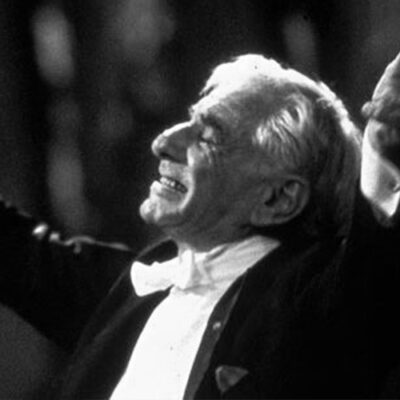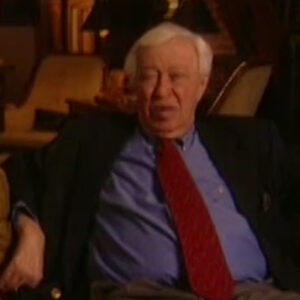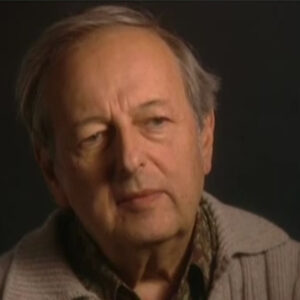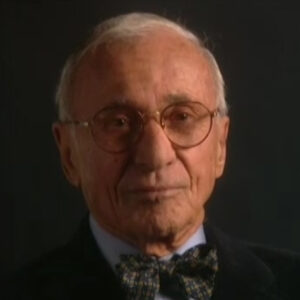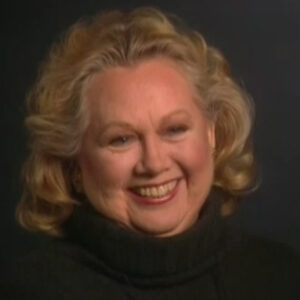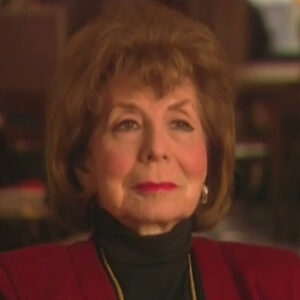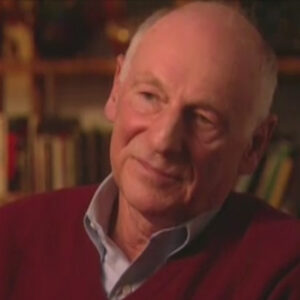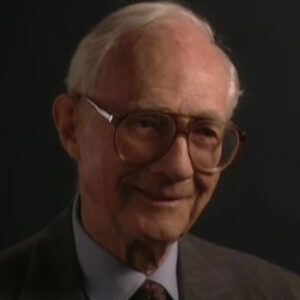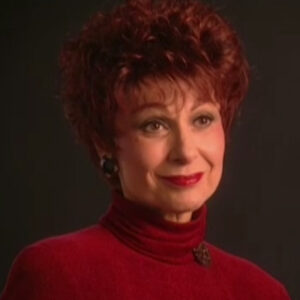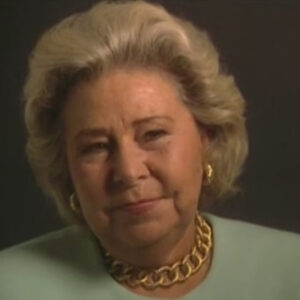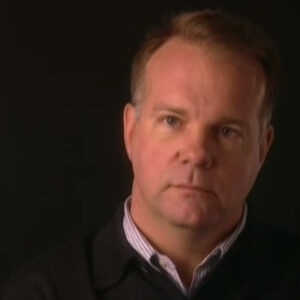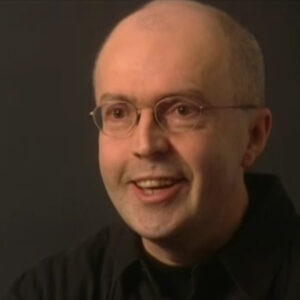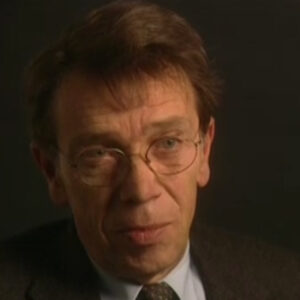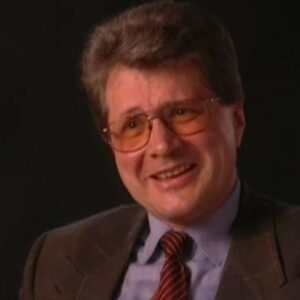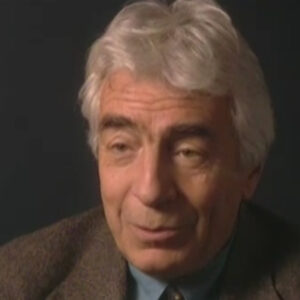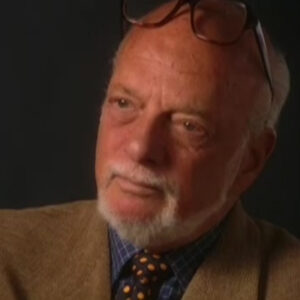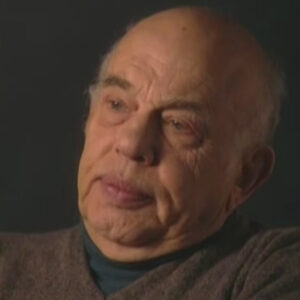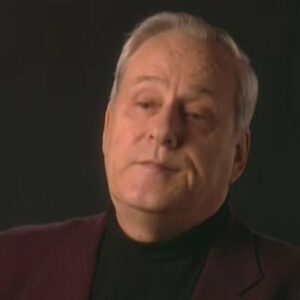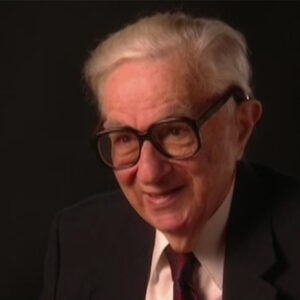Speaker I was wondering if you could talk a little bit about the process of conducting campaigns and conduct what you may have gotten from Lenny and that you are now giving to young students that that line, that traditional.
Speaker You know what I’m talking about?
Speaker It is it is dangerous thing to talk about. You know, Otherside is somebody copy from somebody. It’s not true. And that’s sometimes dangerous. So.
Speaker Like.
Speaker People could say some people quite a long time ago, collision sickness, I mean, somebody copycat or little Bernstine sickness copy from Leonard Bernstein. I was lucky. I was with Lenny quite long time, really long, almost until he died. I saw him 1961, actually, 1960. I saw him in Berlin until he died, you know, was very close to him. So you know how I met him. I was invited by Madam Koussevitzky to Tanglewood 1960 Summer Chamish music director Sharmini. She was not here before September 1959 Besançon in France. International competition for conductor. He was a guest conductor there and I was so moved he could. So I said to him at the party, which gave me first prize, that original contention, I went to him, I want to learn from you. He said, come to Tanglewood. I didn’t know about Tanglewood, nothing. And there was a very nice gentleman, American Voice of America call in a radio those days hasc an American man from Scandinavia nature. But was there happened to be a friend of Koussevitzky. He introduced me to Madame Koussevitzky. So I. I was invited to 1960 Summer to come to Tanglewood and I learned Tanglewood. Wonderful summer for me. First time to come to America and the time. And Mr. Carbajal was a teacher. And everybody talk about the LENY because lady, it was not there this summer, but, you know, Koussevitzky and the little Brustein and the end of summer, Madame Koussevitzky told me, what do you do? So I said, I like to stay in America. And she said, maybe assistant conducting is a good idea. And there were two possibilities. One is George Zel could Cleveland. One is the Bernstine, New York. And I’m fortunate I didn’t know about Cleveland, so I said New York, you know. And so he she called his secretary, Helen Koch, New York.
Speaker And unfortunately, they’re about to leave European tour New York Philharmonic. Helen goes, Jack Gotlieb staying so says you should go to New York and meet Jack Gottlieb. That was September two. I arrived September one. September to. I went to this fifty seven street, what’s the number, Osborne, on that side of the Osborne where Helen lives, Jacot lives and the big studio, you know, the music library. I met Jack Gottlieb. Jack said certain day in Berlin, you should go to this concert. Lenny will expect you and Helen would be there. So you meet Lenny. First time my life was there. So I went. I got the ticket. I went. That was the beginning of a piece was a Roman carnival overture by Berlioz. And then he played the Beethoven number one piano concerto and conduct the next half. I don’t remember. I was excited, but could be Brahms Symphony. I don’t remember. Anyway, after the concert I went to backstage, Lenny knew already why I came. So we have to have an interview. And he wanted to have a committee with and maybe he thought backstage, frankly, radio station in Berlin, but very small and not good. Let’s go restaurant. And we ended up bar drinking the dark with some five committees, maybe five New York Philharmonic players and some manager and Lenny and. No women, no, not Helen, but still remember the name of the Bible, the RIFIFI, which is a you know, the three time striptease show comes up and with a skirt.
Speaker That was my interview. And I spoke no English terrible. But those days, my English like this and this much French, because I lived in Paris and came in with a drink and I was hired as a as the wild wild, you know.
Speaker He remembered so much about this meeting and then immediately I went to but I was a student that year, started myself on Kalayaan student. There was a competition I won. So I stayed until February. And then I received the official invitation December from the New York Philharmonic. You are one of the three assistant conductor. So but even I was young. I hear Arabistan and myself on my Kayan is like this too big, you know, already like this. So I so afraid. But I took this letter to myself and one of the lessons I think it was January or so. What I should do, he said, you must go, this is a great chance, you must go say hello to Lenny. So I got OK and I stayed until February and then went to New York and I became assistant. And then about a month later, we went to Japan or easier to speak to. And then he learned what is then, you know, then is a Buddhist.
Speaker And here he asked me to go, so we went to one of the very seaside, then, you know, the shrine at. I don’t do anything like I don’t know, nothing, but I learned from that time. Then and he went before a concert, that tour each time before, because he must have then with me.
Speaker That’s because I said that much is very, very interesting.
Speaker They go, boom, and he really believed it. He thought this is a great, powerful concept to concentration. So that is the beginning of my Lennie’s time. And you know what he did? I contacted he asked me to contact the bacchanalia by. She reminds me composer. Japanese composer, specially written for this tour for Lenny and Lenny in New York, Carnegie Hall, Joseph Still Carnegie gave me the score, said you study this. So I studied. I was at one of the So natural’s and you score, then you conduct. And I conducted the premiere and you, Carnegie and I conducted all the tours. This piece.
Speaker Imagine for Mr. Mousavi, who wrote for Leonard Bernstein and ended up at Seijas unknown young conductor with New York Philharmonic.
Speaker Why did you do that? I don’t know, because I came back after three years in Japan as assistant to Lenny. He want to introduce me to Japanese audience. That’s one. I’m sure that. And then he did after that, when we went to tour Detroit and Milwaukee somewhere to end the concert, he conducts a whole concert. He makes the announcement. He asked me to conduct it and called this. I was very I thought it’s a crazy, you know, an audience, not for the want of this.
Speaker You know, why Lenny’s concert. And they wanted Yelinek and Colbys.
Speaker I think it was a candid overture for semiconductors and the Firebird, the last part of the suite, something like this short piece. So that much, Lenny, when Lenny wanted to help somebody wonderful for young people, not just for me, for many people.
Speaker Yes. I was going to ask you that. You know, he was, as you know better than I am sure, helped a great deal as a young man by many other companies.
Speaker And one had the sense that he wanted to do this for other young, very promising conductors.
Speaker Coming up know and you just said that very nice.
Speaker Also, he very interesting. He’s great teacher. You know, he’s a great educator. And I know and he knows. But when we are six and three of us assistant. He never put ourself teacher and student, he said, this is a colleague and it’s really he meant one time he conduct a human being when you see major symphony in the finale.
Speaker He did very slow and.
Speaker I didn’t know what to say, but I had to say. Don’t you think that’s too slow? He said the next time he contacted, he said, Sagi, make sure you go to the audience to listen this. I’m going to try FASTA tonight.
Speaker He knew if he doesn’t say to me, I ended up doing a concert to go by and drink beer, you know, you got to realize that, you know, you don’t have to be there all the time. So it makes you sad. You go. So I went.
Speaker And then he asked me, it’s a really very open. I learned so much as to be so much open. And I’m sure he did say to me, I don’t remember anything he said to me.
Speaker How to read school, how? He said one thing very interesting. If you study very deep, I think it was Malha, some school he conducted, you know, very I was lucky when Lenny did many times he’s alive first time Mahler symphonies, you know, like opened Mahler life music in New York, Carnegie. And also, we move to Lincoln Center. Same time I was there three years, two and a half years, so that I moved. He said, When you read carefully and studied carefully, when those music notes composers of music, they’re like, why he put this note I or a conductor feel I wrote this note. He said, If Lenny feel that this note I wrote, then he knows this this piece is mine to conduct. That’s wonderful, you know, because he’s a composer. He died just so deeply so not just to know, to read product, to perform. Why this note is there is his music like he wrote this note.
Speaker Do you think that that is the single most important characteristic that distinguishes Lenny from other conduct?
Speaker I think Lenny was a genius. You know, everybody knew. Only thing I felt is almost sorry for him, he did not know he really wanted to be a composer or he really wanted to be deeply conductor or at the end of his life, he really wanted to be, I think, educator.
Speaker The three composer, conductor, educator, I think in his always life, and sometimes he said, I don’t want conductor next eight months only compose end of composition time. He is trying to conduct. You know, I feel it. And when he made a young people’s concert television cycle, wonderful. I was there when Jack Gottlieb and all his assistant making this how you go, how you say, you know, to make programming you the. And this was very nice style. He doesn’t say spontaneously he write everything and then, you know, the technique is like a mirror goes and he reads, but he if you watch television, he’s saying to you, you know, but every word’s already planned and to make these things. And I could not understand everything he says or they talk. But I was there because as assistant always wonderful how much this one theme this day program, it’s talk about opera. He did a Carmen and still I agree with him. Karmelita, one of the really best of private existence sort of government at the same time without a business music NextRadio actor and actress doing Carment by words, no music. And he compared why opera is different from theater and so easy to understand. But it’s so deep he find the words to show most important things. That’s a great talent as an educator for not musical audience, but the general public know of.
Speaker You said a moment ago when he was a genius.
Speaker Everyone knows that that’s a very overused word.
Speaker But I think it’s accurate when you think it’s genius.
Speaker Yes, because of eyewitnessed. I was reading in so many cases, but it’s very hard to explain and. One area I still don’t know how he does it, he loves words I don’t understand, but he loves word game. When they started that, I will complete it out. You know, I just drink beer. But that’s also I thought he’s challenging very clever assistant and he always wakes up and he wanted to be that way. For me, it was very lucky I saw myself on Kalayaan as a student very closely and completely different style and different lifestyle, different mentality. But the great music making and the Leny I call, I thought, good, very good American. You know, good American. He is Hosie, you and I, he and I, he tried to be same colleague, which is for me coming from Japan that exist from Europe. No, but here he really showed me without any effort, just naturally.
Speaker So no problem to call everybody called Lenny and.
Speaker It fits in, fits his whole view of what he was trying to do with music, which was to democratize it, so to speak, to make it available to everyone I know I like you to talk a little bit about.
Speaker I think it was it was it’s I sense that it was very important to Lenny because he was also a musician and player as well. And it’s going to be one with his orchestra to be at one. On the other hand, I think he liked being maestro, but I think when he was with his orchestra and he was conducting, he really there was a bond. I he talks about it a great deal. Can you describe from your point of view as both someone who worked with him, who was an assistant and then what how you would describe how he achieved that bond with this orchestra?
Speaker No, that’s very natural, his nature, you know, I don’t think he he he how you he spent his energy to be that way. Very nature and. He was very free man in his head. I thought he for him is no existing rules and he has many rules. I think that was a little problems, time rules, you know, schedule rules, union rules. But other than that, he wanted to be just one to man, man to man everything.
Speaker And sometimes even including me, some musician take advantage of it, you know, because Lenny is like a little easy, you know, that kind of thing.
Speaker But he that was only his weak point, I guess is too easy to go to Lenny. When I see his teaching in Tanglewood, you know, his love was in Tanglewood and I was already musical director, Boston Symphony. He came to Tanglewood many times. He breaks. He broke all the rules in this field, but wonderful. That sort drove crazy office or schedule people or me. But what he did was so nature and so spontaneous, so much tried, you know, his that day what he wanted teach that day, what he think go to the student. Right. Well, and that’s very real.
Speaker Very real.
Speaker And he loved working with the student orchestra and.
Speaker When as he got older, what did attended the Tanglewood, Tanglewood, his feelings about change would intensify or change or what? How did age entanglement and was when he got older? How did they connect?
Speaker I think he didn’t want to be older. That is his maybe problem even. And he and until really lost me a moment, he acting very young man and mind young man. Unfortunately, very last few few weeks he become, you know, just God didn’t give him enough muscle to go on. But really, he was a young mind and he just refused to be old. I never felt he is getting old. He looks old, of course.
Speaker And Tanglewood, I like to keep his you know, he always saying Koussevitzky spirit.
Speaker Koussevitzky goes in there and he wanted to keep this, but my job is now I try to keep from I never met to Koussevitzky, but I knew Lenny so well. I like to keep the spirit going somewhere.
Speaker Lenny’s spirit is really rough going through after, like, storm, you know, storm storm comes to Tanglewood and after the storm gone, everybody. But it’s one I miss so much after after he died.
Speaker Tanglewood is not the same. And we I have to work so hard to feel like I miss we miss him, but I miss really very much.
Speaker Describe that energy. You said that storm described that energy. What was it like? Can you can when he came in and was this all the way up to now?
Speaker I think so. I think so.
Speaker He wanted to hear what he what he does it what he wanted to.
Speaker He did it, you know, so nobody can stop it. That’s a wonderful way to live, but sometimes difficult for other people.
Speaker But he knew what he wanted to, by example, two hours conducting a lesson in this setting back where Koussevitzky lived. And he loved this place and the fancy place and Koussevitzky, the room he teaches and. I watch two hours and student two hours and a very exciting two hours.
Speaker Someday, sometimes he just decided to continue not 15 minutes, not half hour, two hours, then, you know, student gets upset and the pianist who played for the conductor, to be honest, I feel like this. I had to pull him out of class. That’s kids, that kind of man.
Speaker And he has energy. You know, he just go and grab this student to to until these guys understand what he meant by by action, you know, why do you think he like teaching so much?
Speaker He why do you think you like teaching?
Speaker So I don’t know that he was so talented to teach. He has a passion to teach, I think may come from Koussevitzky time. You know, he really always repeating what Koussevitzky said. So he feel that he must give this to young people and happen to be he’s so talented to do this. So it’s wonderful, you know.
Speaker Can I say a little bit like professional area?
Speaker I think I’m right, you know, when any contact for me was shock, like he jump jumps or his this is very not before. It doesn’t exist, didn’t exist.
Speaker His gestures only he can do all it and could be very American way of gesture. You know, I saw when I opened my eyes and watching him and listening Beethoven, what he does, Beethoven is kind of what I call unique and different, very different from but non orthodox that I want to say, well, when I don’t watch him listening, only music.
Speaker He is basically very basically very orthodox, very traditional.
Speaker Of course, he’s very put the 20, 30 percent more his way of expression, but the basic music is very, very orthodox or.
Speaker Almost conservative, but very dangerous things, young people to see he’s conducting away and. Even at his base, he’s basically he’s very well trained because of visualising how he looked, young people copy. This is why I said it’s dangerous and that’s dangerous. Looks like Lenny, but the music is not. So I learned, what, all many years and I was learning when I close my eyes. His music is really. Not to strange or not to, you know, sensational and wonderful, but he looked very you know, he looks like a like, hey, do you think that.
Speaker What are you saying? That if you watched him conduct, you heard the music differently?
Speaker I tried too many times. I tried to close my eyes and watch listen to him. It’s wonderful. So I knew that his gesture is not necessary. His music, but that’s where he was born. You know? He cannot say hello. He can say he must say hello. You know, he must go and kiss. Well, that’s his way. But his basic thing as a nature is very normal.
Speaker You think, Larry was I mean, your experience with him was obviously one of great generosity. Do you think he was generally a generous man with other musicians? I think so. I think so.
Speaker And he knew he was very successful. And also his wife, Felicia. You didn’t know, but I knew and I was very poor, you know, one hundred dollar one week salary in those days, you know, not. And and then I started work, so I’ll get some more money. And my wife came I went to his house. She knew and she look at my wife same size. Oh, come, come and give us dresses. It was wonderful, you know, and many times I ate in a free lunch from our drink and he always wanted to help some.
Speaker You know, the drink and the food is very small example, but in music to, you know, example what my but it’s a great guy like this and myself, I’m kind of in a completely different way. But he invited me to Berlin Philharmonic from 30 years back is five years and complete different styles. But so great man. It’s always that way. And I wish I could be that way, too, you know, but it’s difficult, very difficult to do this. Well, I’m sure you are. I don’t know. But it’s very difficult to be that way to to. Find a person and give these things, you know. But big guy could do it, so it’s wonderful.
Speaker We commissioned him, Boston Symphony. I think our 100 year anniversary, I think I hope I’m right. And he said I write fanfare three minutes.
Speaker Of course, I don’t know how many minutes.
Speaker That’s the big piece by six or seven sections. Wonderful, some peace, a little jokey humor, and of course, I had to prepare very carefully because the ladies got there. I had fun, but. And he was there. I was 110, obviously. Yeah, hundreds of MWP.
Speaker I’ll talk to you about the. Yes, I had to ask a question. So what do you say? Many details. What he meant to be wise.
Speaker And and I think he enjoyed it very much. What we did, Premier. I had to study mad.
Speaker A big buzz coming composer, conductor going you.
Speaker It’s a bad case, you know, no choice I had to study.
Speaker And what in general, what did you think of that? Lennie’s composition.
Speaker There are two, you know, two completely different Sirius and the Broadway and the serious part like criticisms Kent caddish Jeremiah and Serenata Violin and The Age of Anxiety Piano Concerto. Like those, you know, for me is very high music, a Broadway music. I don’t know everything. Of course I know West and West Side stories and waterfront and that can lead. Even candid, not much played except Overture. It’s wonderful music inside and for Lenny, I think both are very natural. I don’t think Lenny had the two sides to do this. And that, I think is very both a very natural. Age of anxiety is a wonderful thing.
Speaker Not bad. And. Jeremiah.
Speaker Caddish big piece, you know, and we are keeping playing, you know, like a tradition in Tanglewood. Yeah, we have a nice Memorial Day, Tanglewood, and, uh, usually we use a young people to, uh, introduce, so I think Lenny’s spirit is still in Tanglewood.
Speaker Give me anything I didn’t say, I want to say no.
Speaker Yeah. Let me ask you question. Yeah.
Speaker Do you think that that coming to the table would help Lenny keep age away?
Speaker Maybe, maybe, you know, maybe say yes, maybe.
Speaker Maybe, you know, he has a fantastic memory. I mean, actual memory, memory of when he was young with Koussevitzky, so when he comes, almost too much for him. And he must have you realize repressurize. That age time, young and learning.
Speaker Experience in learning, learning, and that this is why lesson comes along and the orchestra has we have long, you know, and go wild with orchestra until they get it.
Speaker And so I think he connected his young age, Tanglewood is for him. I had a great time with Lenny Tanglewood and we tried to keep this, you know, Tanglewood, this free mind and try everything young.
Speaker Do you think it maybe helped you forget he was getting old?
Speaker Maybe, just maybe that Tanglewood made him forget his age. And so, you know more. I see him lately, last 10. Twenty years and Tanglewood, and he was acting very you know, while driving lifestyle is go.
Speaker Uh, convertible, yes, convertible. Yes, that’s right. That’s what I want to say, and I’m the nature and drink, eat outside, you know, barbecue, eating, drinking and student to have a beer together.
Speaker Wonderful. I like to picture at my mind to keep that.

